South Korea Cultural & Political Influences
Culture
- While Korean culture is unique, it is often confused or co-mingled with its larger and more powerful neighbors like China and Japan. The culture has also undergone many changes in recent generations.
- Koreans share 91% of their ethnicity with Japanese people, but Japanese culture evolved into a distinct culture tens of thousands of years ago, likely when the two islands became separated by rising sea levels.
- Korean culture is heavily influenced by Confucianism which places harmony and a natural order to society at the center of its philosophy. Confucius was a philosopher and teacher who lived from 551 to 479 B.C.E. Studies show that many people of the ‘Ruist’ belief (Confucianism) were interested in natural phenomena and human nature and wondered about the relationship of human beings to the broader world around them, though it is not clear if this is/was a universal sentiment. Others have stated more broadly that Confucianism holds that all creatures stem from nature. It stresses that benevolence be shown to people and all other creatures, extending a spirit of benevolence to everything in the universe.
- There is a strong history of Traditional Ecological Knowledge (TEK) of Korean islanders, in particular. Women divers and fishermen in particular noted the adjustment to routines and geographic areas used to collect and fish as climate change impacts have altered the natural environment and many times they have adapted appropriately, but may also benefit from modern science to become more sustainable.
- South Korea’s constitution states that the country should endeavor to maintain international peace. It stipulates that international treaties signed and promulgated by the country and generally accepted international laws have the same effects as domestic laws. This means that the country has a strong orientation towards reconciliation, consensus and partnership when resolving high level crises.
- South Korea strives to promote friendly and cooperative relations with other countries. South Korea is committed to carrying out positive activities as a member of diverse international organizations such as UNESCO, IMF, APEC, IAEA, ILO, WHO. South Korea became a member of the UN in 1991, and joined the OECD in 1996.
- In 2019, a survey conducted by the Asian Institute for Policy Studies measured South Korean attitudes on climate change...
- The South Korean public consistently shows a high degree of awareness and concern about climate change in relation to people in other countries, yet the South Korean public’s concern about climate change is lower than that of other traditional environmental problems, such as air pollution and waste management.
- Respondents tend to believe climate change is mainly caused by human use of fossil fuels. This sentiment was especially strong among the progressives and supporters of President Moon (2017-22).
- There is broad recognition in South Korea about the seriousness of climate change (92.4%).
- A majority (66%) believe that there needs to be a country effort at energy transition, but responses differ between liberal and conservative-minded voters on how to do this.
- Many fans of the famous Korean Pop (“K-Pop”) entertainment industry are young and socially conscious, even putting pressure on the industry to abandon Non-Fungible Tokens as revenue-generators because they produce a lot of physical waste.
- A poll conducted by the Asian Citizen's Center for Environment and Health in 2022 showed that 9 out of 10 South Koreans feel climate change firsthand and are willing to accept any inconvenience caused by policies to solve the problem. Details include:
- 74.4% said they will switch to electric or hydrogen vehicles;
- 58.2% and 53% said they will start a vegetarian diet and bicycle commuting;
- 58.9% of respondents agreed with the government's nuclear power phase-out policy, compared with 41.1% who gave an opposite opinion;
- 52.9% agreed with the claim that electric charges would skyrocket when nuclear power is phased out.
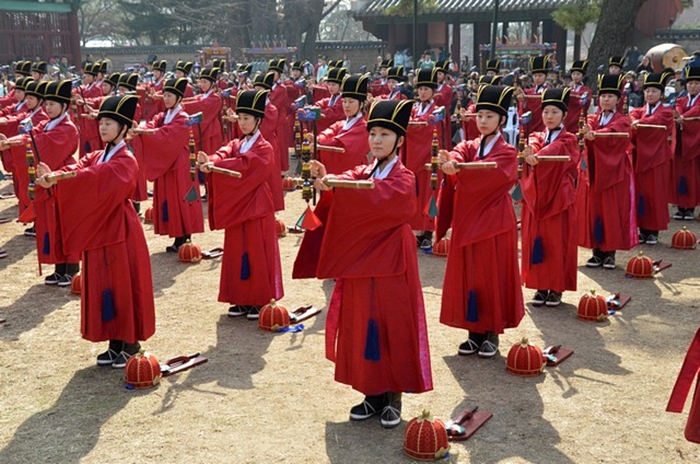
Confucian Ceremony at Sungkyunkwan University, Seoul
Politics
- Since the hostilities of the Korean War ended in 1953, the Republic of Korea – one of the “Four Asian Tigers” – has grown from a developing country into a significant economic power with the 12th highest GDP in the world.
- South Korea’s Constitution adopts liberal democracy as the basic principle of governance. The Constitution guarantees the people’s freedom and rights under various laws. It also guarantees equal opportunities in all sectors, including politics, economy, society and culture, and recognizes the necessity of establishing a welfare state. The Constitution also stipulates that all people have the obligation to pay taxes, engage in national defense, educate their children, and work.
- Three branches of government: Executive, Legislative and Judiciary.
- The National Assembly (Legislature) is composed of 253 members elected in local constituencies and 47 members elected through proportional representation. The latter are meant as a means of bringing persons with specific professional expertise into the assembly.
- The Judiciary of the government is composed of the Supreme Court, appellate courts, district courts, family courts, administrative courts, and the patent court among others. The Supreme Court Chief Justice is appointed by the President with the consent of the National Assembly, and other Supreme Court justices are appointed by the President upon the recommendation of the Chief Justice.
- Elected Presidents only serve one 5-year term and cannot be re-elected. National Assembly members can only serve a 4-year term. The term for the Chief Justice and justices is six years.
- South Korea has become particularly known as a major exporter and an industrial leader in many sectors, including electronics, cars, shipbuilding and steel.65
- A majority of South Korean voters have indicated in recent years that combatting climate change is one of their greatest concerns – more than those who consider resulting investments in nuclear energy a great concern.
- The most prominent political parties in South Korea are the Democratic Party and the People Power Party (dominant parties) as well as the Justice Party, Minsaeng Party, Our Republican Party and the Green Party.
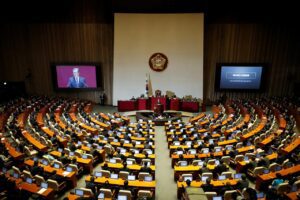
South Korean National Assembly Floor, Seoul
Political Parties
- Democratic Party of Korea (DP) (est. 1995) is a center-left party. The party supports greater human rights, improved relations with North Korea, and an economic policy described as “new progressivism.”
- After taking power, including the Presidency, in a landslide in 2020, the party implemented the “Green New Deal“ that was meant to steer the country’s transformation into a low-carbon economy.
- The manifesto explicitly referred to the “Green New Deal” plans of Democratic candidates in the US and the EU’s “Green Deal for Europe”.
- The plan includes large-scale investments in renewable energy, the introduction of a carbon tax, the phase out of domestic and overseas coal financing by public institutions, and the creation of a Regional Energy Transition Centre to support workers transition to green jobs.
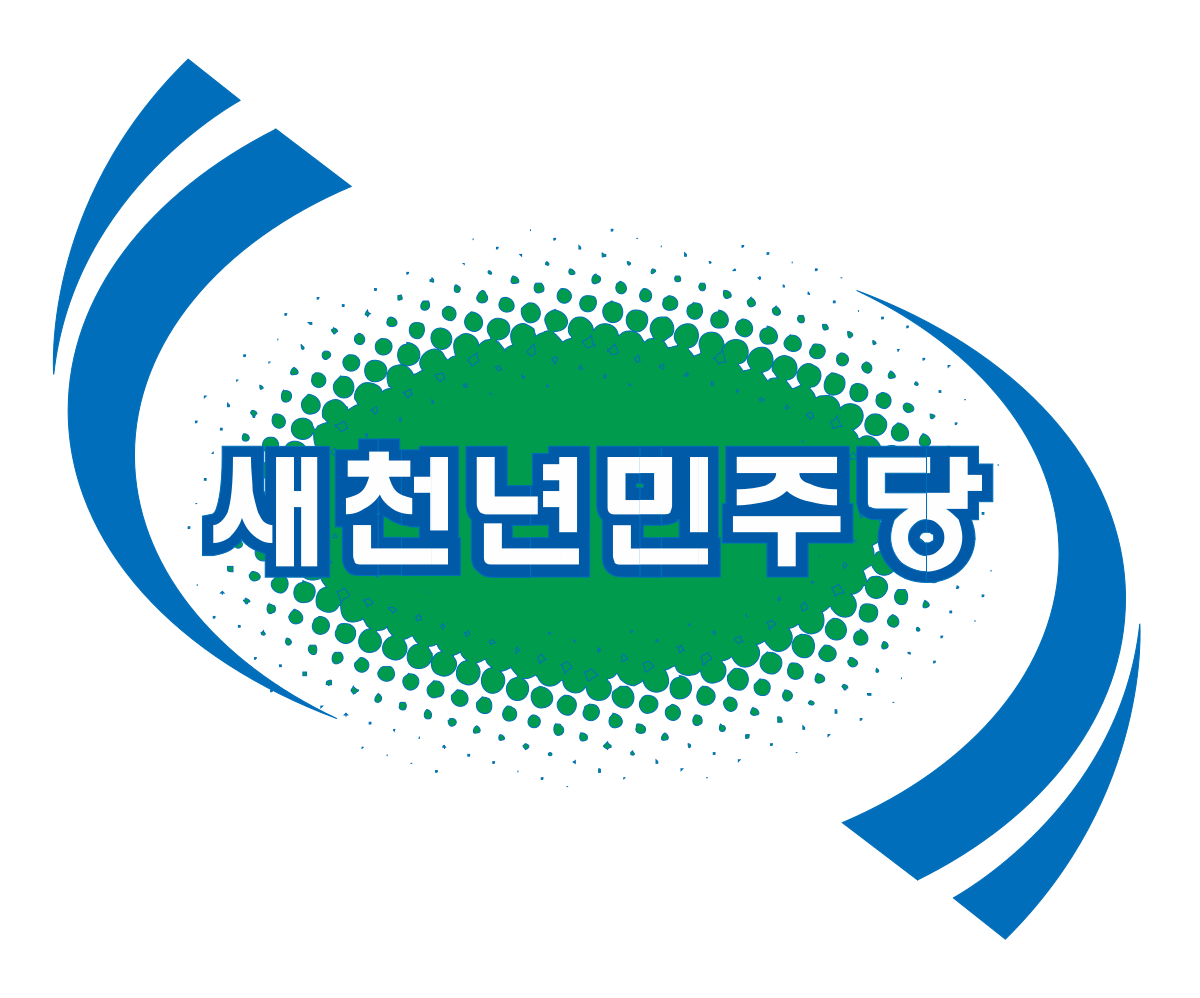
Democratic Party Logo
- People Power Party (formerly known as the United Future Party) (est. 2020) is a conservative political party. Their leader, Yoon Suk-yeol, was elected President in a very close race in 2022, defeating the Democratic Party of Korea by only 0.8% of the vote. The party believes in economic liberalism (strong support for a market economy based on individual lines and private property in the means of production), conservatism (political and social philosophy characterized by Korean culture traditions originating from Confucianism), social conservatism (places emphasis on traditional power structures over social pluralism), right-wing populism (focus on cultural issues, often aim to defend a national culture and identity against perceived attacks by outsiders). The domestic campaign pledges of the party in 2022 include:
- A plan to boost economic growth by scaling back corporate regulations and lowering taxes which may impede curtailing environmental damage and undermine the “Green New Deal” of the previous administration.
- Revise the country’s de-carbonization plan to place more emphasis on nuclear power rather than gas and renewable energies.
- The Brookings Institute projects that South Korea will still join the U.S. and other Quadrilateral Security Dialogue countries (Australia, India, and Japan) in the Indo-Pacific on issues including maritime security, cybersecurity, climate change, and COVID-19 vaccine distribution, even if formal Quad membership remains less likely.
- It is assumed that scaling back on climate change pledges by President Yoon will not happen easily given the country’s interest in addressing the issue, approval required by the National Assembly which has a Democratic Party majority, all of the pledges made by the previous administration to the international community and the fact that President Yoon’s party did not win election by very many votes.
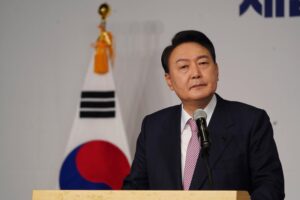
Yoon Suk-yeol, President of South Korea
- The Justice Party (est. 2012) is a center-left party. Their “7 major visions” of the Party entail:
- Political reform for democracy and a strong party
- Democratic reform for Korean capitalism and an alternate economic structure
- Environmentally sustainable society
- Universal rights for citizens and expansion of labor rights
- Society without discrimination where everyone is respected
- Universal welfare support for all stages and areas of life
- Leader of peace for East Asia and the Korean Peninsula
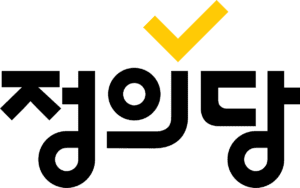
Justice Party Logo
This information was collected from a variety of sources, specifically chosen by Bound International staff, and may also reflect direct travel knowledge by Bound International staff. Do you have something to add or recommend? E-mail us at info@bound-intl.com.
